Related Research Articles
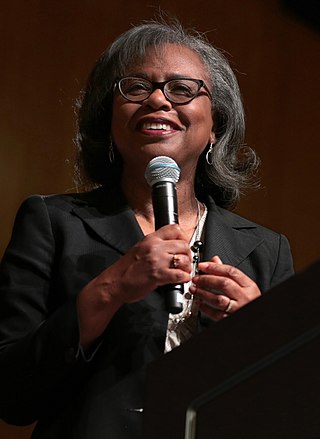
Anita Faye Hill is an American lawyer, educator and author. She is a professor of social policy, law, and women's studies at Brandeis University and a faculty member of the university's Heller School for Social Policy and Management. She became a national figure in 1991 when she accused U.S. Supreme Court nominee Clarence Thomas, her supervisor at the United States Department of Education and the Equal Employment Opportunity Commission, of sexual harassment.
Schenck v. United States, 249 U.S. 47 (1919), was a landmark decision of the U.S. Supreme Court concerning enforcement of the Espionage Act of 1917 during World War I. A unanimous Supreme Court, in an opinion by Justice Oliver Wendell Holmes Jr., concluded that Charles Schenck, who distributed flyers to draft-age men urging resistance to induction, could be convicted of an attempt to obstruct the draft, a criminal offense. The First Amendment did not protect Schenck from prosecution, even though, "in many places and in ordinary times, Schenck, in saying all that was said in the circular, would have been within his constitutional rights. But the character of every act depends upon the circumstances in which it is done." In this case, Holmes said, "the words used are used in such circumstances and are of such a nature as to create a clear and present danger that they will bring about the substantive evils that Congress has a right to prevent." Therefore, Schenck could be punished.
Brandenburg v. Ohio, 395 U.S. 444 (1969), is a landmark decision of the United States Supreme Court interpreting the First Amendment to the U.S. Constitution. The Court held that the government cannot punish inflammatory speech unless that speech is "directed to inciting or producing imminent lawless action and is likely to incite or produce such action". Specifically, the Court struck down Ohio's criminal syndicalism statute, because that statute broadly prohibited the mere advocacy of violence. In the process, Whitney v. California (1927) was explicitly overruled, and Schenck v. United States (1919), Abrams v. United States (1919), Gitlow v. New York (1925), and Dennis v. United States (1951). were effectively overturned.

The Foundation for Individual Rights and Expression (FIRE), formerly known as the Foundation for Individual Rights in Education, is a non-profit civil liberties group founded in 1999 with the aim of protecting free speech rights on college campuses in the United States. FIRE was renamed in June 2022, with its focus broadened to speech rights in American society in general.
Whitney v. California, 274 U.S. 357 (1927), was a United States Supreme Court decision upholding the conviction of an individual who had engaged in speech that raised a threat to society. Whitney was explicitly overruled by Brandenburg v. Ohio in 1969.
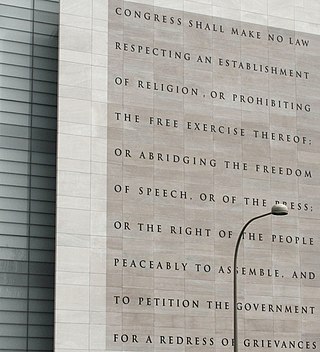
In the United States, freedom of speech and expression is strongly protected from government restrictions by the First Amendment to the U.S. Constitution, many state constitutions, and state and federal laws. Freedom of speech, also called free speech, means the free and public expression of opinions without censorship, interference and restraint by the government. The term "freedom of speech" embedded in the First Amendment encompasses the decision what to say as well as what not to say. The Supreme Court of the United States has recognized several categories of speech that are given lesser or no protection by the First Amendment and has recognized that governments may enact reasonable time, place, or manner restrictions on speech. The First Amendment's constitutional right of free speech, which is applicable to state and local governments under the incorporation doctrine, prevents only government restrictions on speech, not restrictions imposed by private individuals or businesses unless they are acting on behalf of the government. However, It can be restricted by time, place and manner in limited circumstances. Some laws may restrict the ability of private businesses and individuals from restricting the speech of others, such as employment laws that restrict employers' ability to prevent employees from disclosing their salary to coworkers or attempting to organize a labor union.

Michael Ratner was an American attorney. For much of his career, he was president of the Center for Constitutional Rights (CCR), a non-profit human rights litigation organization based in New York City, and president of the European Center for Constitutional and Human Rights (ECCHR) based in Berlin.
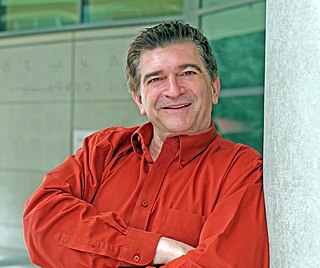
David Michael Skover is the former Fredric C. Tausend Professor of Law at the Seattle University School of Law. He taught, wrote, and lectured in the fields of federal constitutional law, federal courts, free speech & the internet, and mass communications theory. He is also a regionally acclaimed opera and musical theater singer.
The bibliography of Ronald Reagan includes numerous books and articles about Ronald Reagan.
Kyu Ho Youm is a professor and the Jonathan Marshall First Amendment Chair at the University of Oregon School of Journalism and Communication.

Charlotte Anita Whitney, best known as "Anita Whitney", was an American women's rights activist, political activist, suffragist, and early Communist Labor Party of America and Communist Party USA organizer in California.
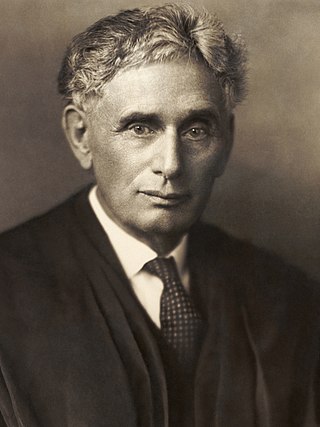
Louis Dembitz Brandeis was an American lawyer who served as an associate justice on the Supreme Court of the United States from 1916 to 1939.
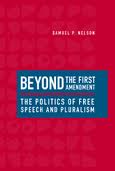
Beyond the First Amendment: The Politics of Free Speech and Pluralism is a book about freedom of speech and the First Amendment to the United States Constitution, written by author Samuel Peter Nelson. It was published by Johns Hopkins University Press in 2005. In it, Nelson discusses how the more general notion of free speech differs from that specifically applied to the First Amendment in American law.

Freedom for the Thought That We Hate: A Biography of the First Amendment is a 2007 non-fiction book by journalist Anthony Lewis about freedom of speech, freedom of the press, freedom of thought, and the First Amendment to the United States Constitution. The book starts by quoting the First Amendment, which prohibits the U.S. Congress from creating legislation which limits free speech or freedom of the press. Lewis traces the evolution of civil liberties in the U.S. through key historical events. He provides an overview of important free speech case law, including U.S. Supreme Court opinions in Schenck v. United States (1919), Whitney v. California (1927), United States v. Schwimmer (1929), New York Times Co. v. Sullivan (1964), and New York Times Co. v. United States (1971).
The San Francisco Workers' School was an ideological training center of the Communist Party USA (CPUSA) established in San Francisco for adult education in 1934. "It was a typical specimen of a Communist school, such as would come under investigation by federal and state authorities for decades afterward.". in the 1940, it emerged as the California Labor School.
Sonja K. Foss is a rhetorical scholar and educator in the discipline of communication. Her research and teaching interests are in contemporary rhetorical theory and criticism, feminist perspectives on communication, the incorporation of marginalized voices into rhetorical theory and practice, and visual rhetoric.

Susan Benesch is an American journalist and scholar of speech who is known for founding the Dangerous Speech Project. Benesch is a free speech advocate, recommending the use of counterspeech rather than censorship to delegitimize harmful speech.
Demers v. Austin was a landmark decision of the Ninth Circuit Court of Appeals, extending First Amendment protection to professors at public universities for on-the-job speech that deals with public issues related to teaching or scholarship, whether inside or outside of the classroom. Demers carved out an exception to a 2006 U.S. Supreme Court decision that denied free speech protection to public employees. In doing so, Demers provided, for the first time in history, constitutional protection for faculty speech that criticizes policies and decisions of university administrations.
Richard Leo Enos is an American rhetorician noted for his contributions to the history of rhetoric. Since the 1970s he has promoted primary research on rhetoric by examination of archaeological materials and epigraphical evidence.
References
- "Haig Bosmajian", September 1999, Shefman.com, webpage: Sheftman-Basma.